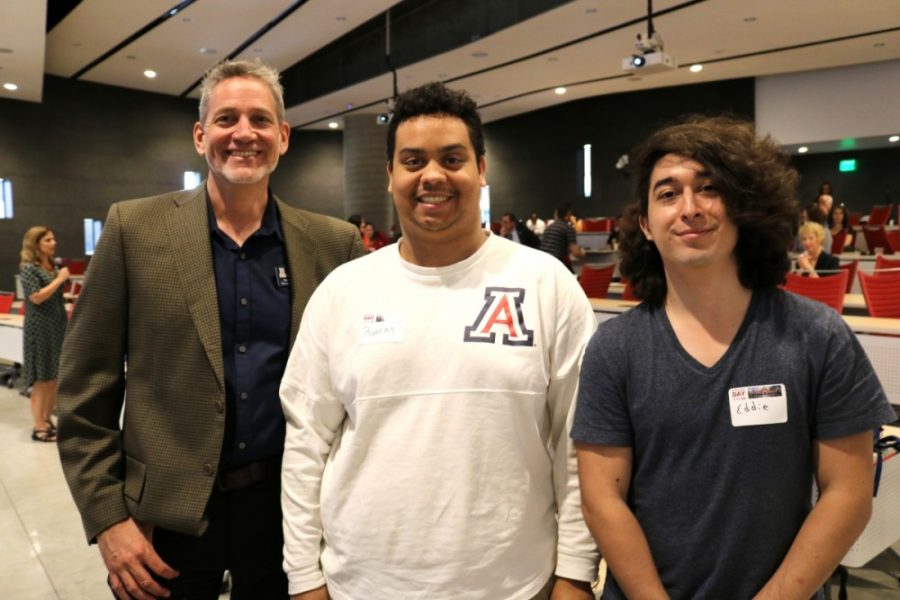The student-developed web solution UA Travel Project seeks to improve university travel. UA students Robert Johnson and Eddie Ornelas, leading developers of the project, are working in Tech.Global to develop the UA Travel Project.
“Tech.Global is a UA Non-credit 100% Engagement Experience created to empower students who love technology, and who have a strong desire to explore the world,” according to the official Tech.Global website. Students work at Tech.Global and gain important technological skills that can be used in the market.
RELATED: Tech.Global exposes students to VR, big data on an international scale
The UA Travel Project is still in development, but Ornelas and Johnson gave a preview of the project at the Global Impact, Global Innovation Panel.
The preview was an interactive, global map that had “Data visualizations like red plus symbols for health alerts, green environment alerts for floods, tornadoes or other natural hazards, and yellow circles under these alerts for impacted travelers, and clicking on the circles will bring up information on the travelers,” Ornelas explained.
The UA Travel Project is being created in order to replace the UA’s current travel system, the UA International Travel Registry. While the Travel Project started out to fix an internal issue in the UA, the UA Travel Project team looks to disperse their software out to other institutions.
“The travel registry software that the University of Arizona, and most universities across the country, uses is just not a very good piece of software and aggravates travelers enormously,” Ash Black, Executive Director of Tech.Global, said.
“The biggest improvement that the UA Travel Project brings is a real-time risk analysis map,” Johnson said. “This makes it easier for students travelling to know all the things they will be experiencing. The risk managers will have everything laid out as far as what’s going on in different countries. It makes it easier for faculty to travel because they will know what to expect.”
With this UA Travel Project, study abroad UA students and faculty would be able to see what risks may be going on in the region they will be travelling to.
RELATED: Students attend Study Abroad Fair to learn about opportunities for international studies
The UA Travel Project team has already created a network with other universities that they are going to market their software to. The Massachusetts Institute of Technology and Brigham Young University both attempted similar projects, but were unable to complete them.
“We found that a lot of people tried and failed to achieve a program like this,” Johnson said. “MIT gave us some of their material that we were able to use.”
Johnson and Ornelas were accepted into Tech Launch Arizona’s NSF I-Corps program to examine the commercial potential of the UA Travel Project.
I-Corps, or Innovation Corps, is a National Science Foundation program “that teaches customer discovery and lean launch methodologies,” Samantha Bares, Executive Associate of Tech Launch Arizona, said.
“I-Corps structures around a business model canvas. This is a way to take a research based thought, or a business where you don’t know much about the market, and start to put it on paper,” Eric Smith, Tech Launch Commercialization Network Manager, said. “This can help structure a business plan.”
The UA Travel Project team with Tech.Global spent three months in the I-Corps program, and created business models and interviewed potential customers.
Students interested in Tech.Global are encouraged to visit their website to see how to get involved with the program.
Follow the Daily Wildcat on Twitter








